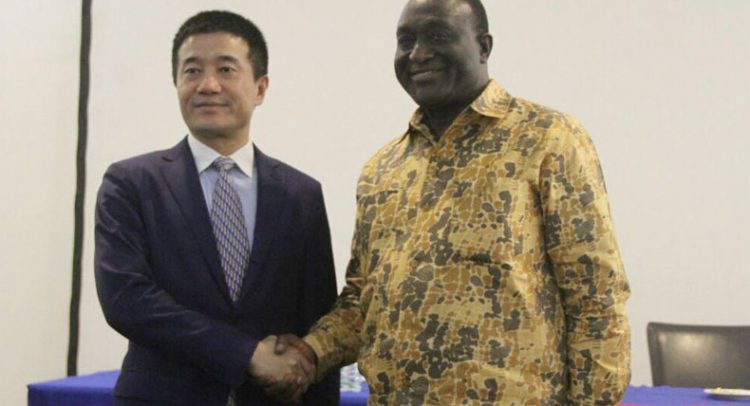Alan Kyerematen and Mr Cheng
The first batch of 22 companies that recently signed various Memoranda of Understanding (MoU) with the China National Building Materials Corporation at the Alisa Hotel in Accra is expected to create a total of 42,300 direct and indirect jobs, the Ministry of Trade and Industry has stated.
This will comprise 8,400 direct jobs and 34,900 indirect ones.
For the starch projects, 2,900 direct and 14,500 indirect jobs are to be created, while in the edible oil/soya milk project, 1,800 direct and 9,000 indirect jobs are up for grabs.
In the garment project, 2,200 direct jobs are ready while 4,400 ones would be indirect.
For the rice & maize projects, 800 jobs are expected, with 4,000 indirect jobs.
With the alcohol project, 450 jobs are assured while for the indirect 2,250 jobs would be created.
For the diaper projects, 250 direct jobs are expected to be created while 750 others are indirect.
The total investment value for the 22 District Enterprise projects is $400 million and will benefit all the 10 regions in Ghana.
According to Trade and Industry Minister Alan Kyerematen, plans are far advanced to roll out many similar projects in other districts in the coming months.
He said the initiative is designed as a comprehensive programme for rural industrialization, involving the setting up of at least one medium to large-scale factory or industrial enterprise in each of the administrative districts of Ghana based on the natural resource endowment or comparative advantage of each district.
A total of 707 Business Plans have been received from Business Promoters, out of which 602 have been reviewed by the Technical Support Group (TSG) of Ministry.
Three hundred and thirteen of the Business Plans that have been reviewed were found to be feasible and could be implemented.
He indicated that these 22 projects have been selected as a result of their significant export potential, particularly within the Chinese market.
The investment value, which is estimated at about $400 million, is expected to generate significant economic benefits, including employment generation and tax revenue.
The Minister commended the Chinese counterpart, CNBM Corporation for honouring a pledge made in 2017 to support the government’s industrial transformation agenda.
As part of this turnkey agreement, CNBM, which is known for quality modern facility and factory construction, will support businesses to market and sell their products in the Chinese market through strategic partnerships and alliances.
The selected products, which include edible vegetable oil, starch, alcohol and garment, will also be sold in the ECOWAS sub-region and the local Ghanaian market.
By Samuel Boadi


